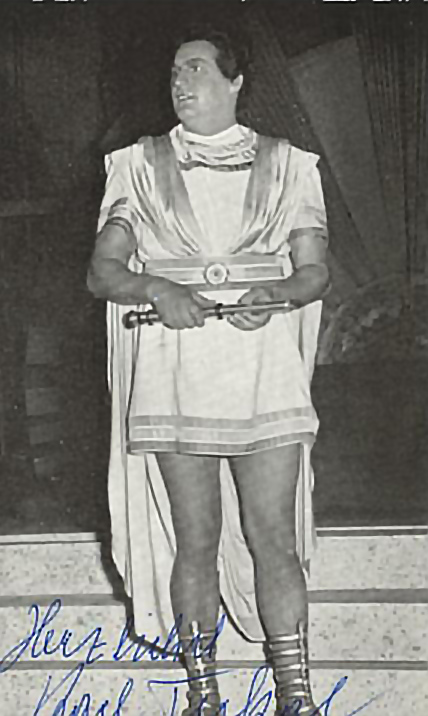Karl Terkal
As a young man, he sometimes sang on the streets so as to make some money. He served an apprenticeship as a joiner and cabinet-maker. 1939 to 1945, he had to serve in the German army and was wounded in Russia. 1945–48, he worked as a joiner in Vienna, also taking singing lessons. 1948/49, he was employed at the Vienna academy of music as a joiner, where his voice was discovered, earning him a one year contract as a trainee at the Vienna State Opera. His actual debut took place in Graz (as Don Ottavio), where he sang from 1950 to 1952. After a guest appearance in Vienna in 1951, Clemens Krauss called him back to the Vienna State Opera, where he stayed from 1952 till 1991. In his early years Terkal sang many leading roles of the lyrical tenor repertoire such as the Duke in "Rigoletto", Rodolfo in "La bohème", the Italian singer in "Rosenkavalier", Alfredo in "La traviata", the Steersman in "Der fliegende Holländer", later also adding more dramatic parts such as Calaf in "Turandot". At the Vienna Volksoper, Vienna's smaller opera house, he even sang Manrico in "Il trovatore" and Arnold in "Guillaume Tell"; at that theater, he often appeared also in operetta. For many years in his later career, when all operas used to be performed in the original language, he turned to smaller roles such as Monostatos in "Die Zauberflöte", or the Innkeeper in "Rosenkavalier" that he sang 221 times, demonstrating his unique Viennese dialect. He often appeared at the festivals in Bregenz, Salzburg and a few times at Bayreuth.
I wish to thank Christian Tögl for the biographical notes.A singer with a truly wonderful voice that didn't unfortunately last long due to improper training and alcohol abuse. His (rare) 1951 radio recording is one of the best Che gelida manina versions ever. |
